Interview with LUXIGON
The interview with MIR I published almost a month ago, followed by great feedback from the community, has driven me to keep exploring the studios I consider interesting and inspirational. LUXIGON is one of these studios, featuring clients such REX, MVRDV, OMA, BIG, Oppenheim, Mecanoo, asymptote, and more in their portfolio. I enjoyed this interview very much, and fell in love with their sense of humor and passion for what they do as Im sure you will too Ill just have to keep doing these. ITS GREAT!
I used abbreviation for the names in the interview like so
- LT is Laurent Théaux
- LM is Laurent Ménabé
- EBC is Eric de Broche des Combes
No need for more introductions, lets just dive in and enjoy the ride its bumpy!
Hi Eric, I noticed in your contact page on the website that both you and Laurent are architects. Let me ask the obvious question (please dont be offended, we are on the same boat) – How come you are doing architectural visualization and not architecture?
EBC: Well, There are many reasons. The main one is coincidence. When I was a student at the school of architecture there was the problem of summer jobs. There was an electric guitar I wanted so badly I was about to do anything. Unfortunately it was a bit expensive and I wasn’t really eager to push trolleys in a supermarket or grape picking again (which I did the years before and found utterly uninteresting and painful). I spent all my school years drawing so I thought why not make architectural illustrations and bam, there you go!
The funny thing is that I lost the first payment cheque. I found it one year later in my bedside table but never actually cashed it. I was very uncomfortable in asking for a new one so I choose to bitterly endure my absolute lack of professionalism. I still have the guitar and it is a damn ugly one.
Then I discovered Photoshop, I think it was version 2, and the first powerful affordable computers and CAD software came on the market so I switched from handmade drawings to computer digital ones. I did practice as an architect some years after school but I’m not really a paper guy and not at all a morning guy. Two qualities one might expect from a serious architect I think. I’m still a registered architect though, doing competitions, some we won, and very often helping in the process way before final renderings. The more I do it the more I consider architectural visualizations as an act of architecture. I’m not really interested at doing “real” buildings but I really enjoy the thinking and the discipline. I prefer theory over practice.
Most of us are architects or designers in the office, from all nationalities. I really don’t feel any bitterness in any of them including Laurent and myself.
LT: I was bored working in architecture offices because the projects often last for many years. Thats too long for me. I need a challenge per week. Also, you have to deal with too many people (engineers, developers, administrations…) who dont have the same goals. As a good nerd, I like to talk with people who use the same language as me; I can speak «architect» or «computer» easily.
What was the trigger that formed LUXIGON as a studio? How old is LUXIGON?
EBC: LUXIGON is 4 years old now but it was the natural continuation of Auralab which I founded back in 1999 with Thomas Series (now Labtop). The main idea was that we found architectural visualizations to be very dull and conventional. “Convention” is what I despise the most along with “hierarchy” and “authority”. LUXIGON was born the exact same day Auralab halted. Laurent Theaux was already working with me, then I called Julien Alma (now “Doug and Wolf”) and a Chinese friend, Shanghong Wang.
We went to a Bar, drank a decent quantity of beers, found a name and made everybody equal. The original line-up changed a little bit with Julien and Shanghong leaving for different reasons, (but we’re still very good friends). And then, Laurent Ménabé joined us as a Partner, and later Benjamin Dawidowicz as the “consigliere”. It has been very stable since then. I have to say that we have the most enjoyable and competent team possible – most of the people working at the office are there from the very beginning and have suffered patiently the zillion mistakes we’ve made, and are still making (names of all member of the team here). They are friends before all.
The LUXIGON team
- Eric de Broche des Combes – Founding partner / Architect
- Laurent Théaux – Founding partner / Architect
- Laurent Ménabé – Partner / Graphist
- Benjamin Dawidowicz – Communication & Business Development
- Julien Pinard – Graphist
- Anne-Hélène Viti – Designer
- Nicolas Gagnon – Designer
- Emna Rached – Architect
- Scott Airlie – Architect
- Sophie Cousin – Graphist
- Salem Mostefaoui – Architect
- Christopher Malheiros – Architect
- Juanito Olivarria – Architect
- Paloma Garcia – Architect
- Fred Peronne – Graphist
Can you tell us about any difficulties you might have had in the early days starting the company?
EBC: I guess most of them are very standard from not being paid to not sleeping for days – not to mention computer crashes, software bugs, impossible demands, moving schedules, hectic processes. Architects are difficult people, to say it politely, its part of their charm. There’s a TV show called “the deadliest catch” for some reason I think our job is really close to the situation of these mariners, but without crabs, warmer and with very little water involved.
Browsing your portfolio one cannot ignore the conceptual and dramatic feel it has, most of the projects seems “larger than life” and dark (at night). Is it because of the type of clients you have or is this LUXIGON driven?
EBC: I think its LUXIGON. Rule number one is “do not make it dull”. We have to show the spirit and carnal part of a project. We need to inject some sort of imagination into it. Architecture is not just a program and some geometric forms, it’s mainly a vision. This is what we are trying to translate but, like photographers or painters, we also have our own point of view. I like night and I’m not at all into dreamy nights. I’m more into Lou Reed or The Ramones than Celine Dion to put it simply.
LT: luckily, were often asked to do what we like.
LM: People who come to us know our style. That’s probably what they want.
How was it to get clients back in the early days, and how is it now? can you define the type of clients you have now?
EBC: I don’t like the term “client”. They’re not “clients” and we’re not “sellers”. It sounds way too mercantile. Sometimes it can really go the rough way when we think we’re right and the architect is wrong. The correct way to do things should be to keep agreeing and wait for the money. Well, we don’t. It’s really working when you go and are ready to fight. Good projects are not made with milk and honey. It’s a harsh process from the very beginning. This maybe is explaining our style by the way.
It has never been simple. We’re only working with people we like. It’s important to feel close to the architecture you have to demonstrate or the people making it.
LT: Its always surprising to see how many architecture offices come to us. They come from everywhere, theyre every size. The only thing they share is that they found a way to find us!
How do you do your marketing? or are you fully booked all the time by repeating clients and word of mouth ones?
EBC: We’re not doing marketing. We have quite a lot of images published in magazines or websites and appreciate being credited for them. Though, it’s not at all a psychodrama if we’re not (credited). We want to keep a small team, in order to maintain high quality, but this is offset by barley having any free time, except for a few drinks. Ambiance matters a lot, more than money, and I don’t think we want things to go *more* insane or hectic as they are quite insane and hectic already.
LT: The «never-up-to-date» website is our only marketing.
What’s it like to work with world-renowned Starchitects as opposed to the small time clients you might have started with? Actual daily things – any interesting stories in this department?
EBC: Actually, it’s great and frustrating at the same time. Strangely enough big offices are sometimes innovating a lot more than small firms. They can also be cooler, or more confident, which helps a lot in doing a good job. On the other hand, the chain of command is easier to handle with smaller firms. We’d like to work more with emerging offices or with architects from emerging countries. Our fees are sometimes too high for them and unfortunately an office doesn’t run on clear water. We’re working on it. Sometimes we’re bartering. I remember we did images that were paid with rum and coffee. Anyway, with the money we would have bought rum and coffee.
LT: We always act as if our small clients were to become the future Starchitects.
Where did Jean Nouvel go?
EBC: West?
LT: He must be looking for his cheque book.
LM: Who is Jean Nouvel?
How much freedom do you have in your client work?
EBC: We’re trying to get as much of it as possible. Projects are not always on the same levels, some are competitions, some are presentations, some are sensitive and some are jokes. Ultimately they’re not our projects. Our intervention is quite limited in time and duration. I can really understand that some need to be more driven than others though the most fun comes when risks are taken. There’s nothing I enjoy more than risks.
LM: We take all the freedom required (whenever possible) to produce the best images.
Can you share more details about LUXIGON’s typical client workflow from start to finish of a project? Do follow the same approach for any client or is it different depending on that?
EBC: It’s always different. There are no real, intangible processes because it’s never twice the same job, even if there are similarities. More or less it’s like so:
- receiving project
- modeling or tweaking a supplied model
- previews
- modifications
- final image
- finalfinal image
- newfinalfinal image
- newfinalfinalok image
- newfinalfinaloklast image
- newfinalfinaloklastultimate image
Can you define the balance between Pure Render and Post Production in your work?
EBC: Again, it depends but I think we’re more falling into the “75% Photoshop – 25% pure rendering” type of firm. Photoshop is where the real thrill is, as well as most of the style.
LM: We dont spend too much time in pure rendering. Flexibility is the key-point in architectural competitions and Photoshop is the most flexible tool.
What kind of hardware do you use?
EBC: We have a mixed park of PCs and Macs. Along with my other flaws I’m not at all a “windows” guy. I have problems with the ugly interface and yellow folders (I know you can change it – But I don’t feel like I have to do the effort). We’re still inscribing CDs and DVDs with small hammers and wood chisels though. Like in the good old days.
LT: I used to be proud of the render farm I set up but now a mac pro alone is better… So my affection is now going to my server which finally runs smoothly.
LM: I use a PC, I have a grey suit and watch my movies on an Archos.
Can you tell us about the software you use in the studio?
EBC: We’re mainly relying on Cinema 4d. Sometimes with the built-in renderer (AR3) and sometimes with VRay. We’re trying all sort of software. I used to love Lightwave and recently bought Luxologys modo in one geeky moment. There’s something interesting with Maxwell and Fry. I think it’s necessary to be on page and up to date but Cinema has always been extremely reliable. It’s very well programmed software and it’s only crashing once a year or so. I’m less than ecstatic with Maxon’s recent moves regarding upgrades and prices politic. I think some enhancements are urgently required but that’s a different problem….
LT: I used to try everything, now Im tired of the constant updates. C4D 11.5 will be perfect for a few more times.
LM: I use Maya and have a look at VRay for Maya. But I think the most useful software in the studio is Photoshop.
Have you been trying the new GPU rendering solutions that are being offered these day?
EBC: Yes. But because you still have to think first, I think that the gained time is negligible. The image is in your brain first. This is the only part that is in need of permanent upgrading.
LT: Not yet ready.
LM: Of course were trying all the rendering solutions but for the moment the GPU solutions is too young.
How much time do you spend working on an image usually?
EBC: It depends. Can be less than an hour or several days. No rules here as there are too many parameters involved. The job is correctly done when the architects like the image and I like the image as well. After all these years I’m still extremely sad when an image doesn’t meet their expectations. It happens sometimes. We’re not perfect and being French is not helping as we’re notoriously dumb, arrogant and lacking of hygiene. I just can’t get no satisfaction.
LT: Thats to say that we dont decide when its finished.
LM: It really depends on the kind of project but we can work very fast – it’s one of our strong points. It’s not the best option but we can make a picture in a day.
Who do you consider as a source of inspiration… Where do you go to find it?
EBC: I’m interested in nearly everything although I admit to having problems with ballets, maths, musical movies and reggae. I was really impressed by “Close encounters of the third kind” because it’s the first movie I saw by myself and was just stunned by the light and special effects that Douglas Trumbull did – I think most of the aesthetic I like comes from it. On the other hand, I’m also a huge Bosch and Rembrandt fan – I owe my parents for that. I also have a slight inclination for beer and vodka and I’ve seen the King Snake. Small travels but still travels. Every travel is good for the mind.
My son and wife are also a very good source of advice and help. There are everywhere in the images. Generally speaking, Akira, my 5-year-old son, is asking for more butterflies and/or ghosts. Very often I’m doing a butterfly ghost version only for him.
On the professional side I have to say that Vyonyx, Mir and Julien’s “Doug and Wolf” are giving us some rough times. It’s very often “boy! I’d like to have done that one! I don’t mind some good, healthy competition.
LM: Filmmakers and photographers are a great source of inspiration. Stanley Kubrick, Stephen Shore and William Eggleston are my favorites. I also like the great concept artists like Syd mead, Craig Mullins, etc.
How does the work load divide among the studio members. does one artist take a project from start to finish, or does it spilt according to specialties?
EBC: Again it depends. Most of us can handle a project from start to finish but we don’t have equal skills or speed on all part so we’re organizing them for the best. Generally speaking it’s good to have a team with calm and wise people mixed with some young angry punks. We’re like a rock band, whatever works, as long as the sound is good.
LM: It depends on the project and artists.
Any other activities besides work going on in LUXIGON, like personal projects, hobbies, etc.
EBC: I’m still making a lot of music. I really equally love music and drawing and it always will be a pain that I had to make a choice between them professionally. Most of my work money is going into musical instruments of all sorts. The rest will go on books and travels. I’m also doing open architecture competitions along with friends with no serious intentions of winning any of them. Oh! And I have a new sudden interest for photography. A subject and a camera and you’re good to go. Even sometimes just a camera can do.
LT: Sleep.
LM: I’m really interested in contemporary photography and of course I practice photography on my spare time just for fun.
Can you share with us some interesting stories about memorable projects / famous project you been working on – some inside stories you can share.
EBC: I can’t be too specific… I guess you can understand… I’ve been through very twisted and awkward moments….
The first project we’ve worked on with OMA a few years ago went extremely bad. There was a lot of yelling on both sides. I thought it was the end of my career as a perspectivist. It wasn’t that bad in the end but I’m still waking up at night, sweating and with a dry mouth. There were no helicopters but I think I can still hear them.
Things are much better these days, although not always simple.
Unfortunately, I’m also famous for sending very nasty emails to members of the team forgetting that the architects are also Carbon Copied. These are great moments of solitude when you hear the sound of the mail being sent and you just can’t stop it.
The apogee was a project I was doing for BIG. They made a mistake about the deadline and I thought I had more time than there actually was, so I went out to party and I partied professionally hard this particular night. Back home I had this email saying they were waiting for the images before noon. I did the image, including computation, half-naked since it was summer, completely wasted and drunk while listening to Wagner’s “Flying Dutchman” taking a cold shower every 15 minutes until the sun rises. They won the competition in the end I’m still really liking the images. Unfortunately the Iceland bank system just collapsed a few months later. I’m still listening to Wagner when things are going really really wrong…
Here are two preview images of BIG Landbanski Bank – Reykjavik
And the final version
again, two tests
And the final version.
LT: The strangest project that we had to deal with was the first set of renderings we had to produce for the Museum Plaza in Louisville back in the Auralab days. OMA-NY contacted us asking for few renderings to illustrate an article in the New York Times. They sent us the 3d model without any comment. We discovered this exceptional project and naturally felt like trying unconventional viewpoints (from under the highway, from the roofs around… no street-view, no lobby…).
Eric sent the previews asking them to give us ideas of the viewpoints they wanted us to work and we received one of the most unexpected email ever. They loved it just like this. So we spent the 3 following weeks checking nytimes.com 10 times a day to know when to go buy the paper for us and our mothers. The images never came to be printed but we were the first in Europe to know that OMA-NY was splitting to become REX.
However, this set of renderings turned out to be LUXIGONs most successful and the start of our international reputation.
The technological advances in hardware and software allow more people to enter the architectural visualization field with less effort and experience, Does that effect LUXIGON?
EBC: I don’t think so, at least not for the moment. It’s a bit like comparing the painter to his brushes. We have a certain “expertise” that just can’t be acquired because the software is faster or easier to use. Experience is invaluable in some cases. I still think the essence of our job is understanding more than producing. This is the first moment a project is seen through different eyes. If you miss the point the whole team will be disappointed and it is extremely damaging for the moral. We feel responsible for the people who have worked hard on a project and are always thinking of the consequences if we fail.
That said we’re keeping an eye on every raising technology in case we have to fight back fast and hard. We’re not all candy.
LT: It doesnt affect us for the moment because architects and developers that deal with multi-hundred million dollars projects need to trust the team they work with. Getting there has been a very long road.
LM: Producing good images is not a question of hardware or software.
Can you share some work in progress drafts or sketches for a single project, representing a start to finish cycle, as I’m sure that will be very interesting to see?
EBC: We’re doing very little previews, normally only one, before we attack the final renderings. I like energy well spent. Better to jump in cold water, no?
Images of OMA-NY MNBAQ previews.
And the final.
Images of G-REX-SITRA Previews & Photoshop development capture.
The process capture…
Final versions.
Can you share information regarding the modeling of the Kaoshiung Cruise Terminal project? Was it done by LUXIGON or in-house at asymptote? if by LUXIGON, what did you use – can you share some insights?
EBC: The model was done by Asymptote in Rhino. We had to remodel most of it in-house because it was way too heavy and we had a commission for a 3 minutes animation and 5 or 6 images in a 2 week timeframe. The heavy model could have been handled if only images were to be produced. Knowing that the whole project is made of blurry metal I think weve seen a glance of hell. The Asymptote team has been very kind and helpful all the way; this is probably the reason why it didnt turn into a complete disaster. Weve discussed a lot about the project over the phone but they didnt see anything until the last few days. Theyve even downloaded the movie from Taiwan without any idea how it will look or sound. Weve hired a huge 160 cores render farm, weve called it or her «Christine» like the evil car in Stephen Kings novel. I think that at some moment it was 45 minutes computation per frame.
I know that asymptote work internally with the Felix Online Render system by Stack Studios, and I think I’ve seen images of this same project done with it too… can you tell us what did they look for in LUXIGON in the creation of these visuals – What did the ask of you to achieve?
EBC: Im still wondering – maybe they also like to take risks. We had no precise demand really and it was the first time we were working together. Its a very expressive project. In a way we were driven by the project itself.
That aerial visual of the Tena Tower project is so impressive I really want to learn more about it. What is it actually?
EBC: Its a mixed program of offices, hotel, flats and villas near Ouagadougou/Burkina Faso.
Architect is Manuelle Gautrand. An extremely nice French Architect.
How much freedom did you have working on this project?
EBC: Were used to work with Manuelle, so pretty much all the freedom required. But were not doing graphism for graphism, it has to serve a purpose. The range of freedom is somehow enclosed or included in the demand. Were going with what seems to work the best and if possible make it a little spicy.
What were the biggest challenges in the making of this project?
EBC: We were in the middle of summer and a very few people were at the office at this particular period. We had to temporarily recruit some guys from outside and they werent used to the process we usually have. It has been a bit hectic. Ultimately Nicolas (Gagnon) choose to come back earlier from his vacation to help reaching the deadline. Its the ambiance I was talking about before. He just said «Ok, I will come back early, just have to finish my cocktail and cancel my plane tickets to get new ones». It went very well in the end.
What tools / software did you use on this one?
I think it was a mix use of Rhino, C4D and VRay … and massive Photoshop.
I enjoyed making this interview with Eric and both Laurents very much, and I hope so did you. You are welcome to comment on this article and ask questions using the comment box below! Surfs up!







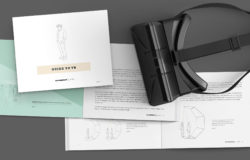
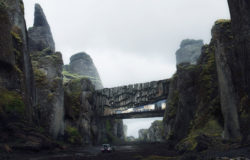


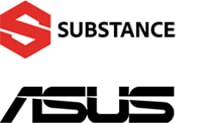







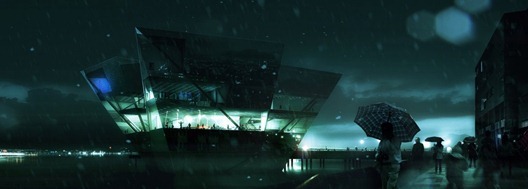
















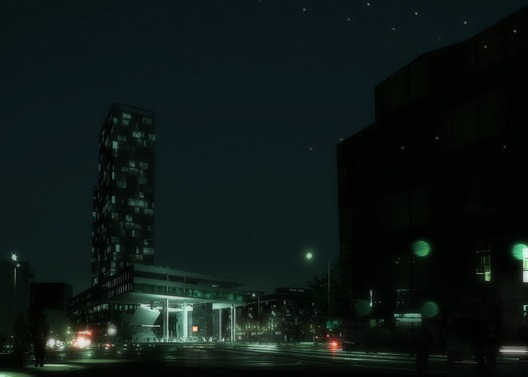

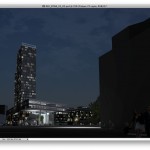
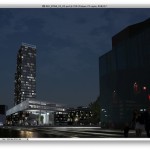
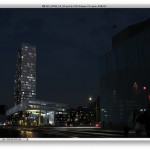
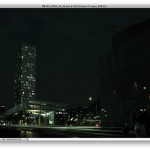
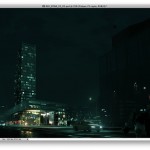
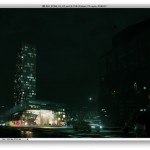









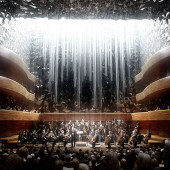
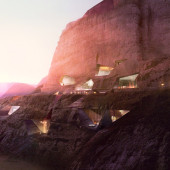
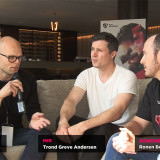
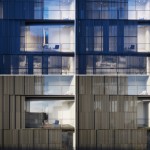
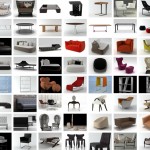
After the great MIR interview, another interview of one of my best prefered studio. What can i ask for more ?
Thanks Ronen !
You are welcome… I have several options inline and wait for approvals. I’ll keep you posted about it.
I learned a lot from this one and the MIR interview too. I was very interested to know how top studios working with world-renowned architects go about doing their work.
Both MIR & LUXIGON relay heavily on Photoshop / Postwork, rather then pure 3d, My personal inclination, as well as of fellow artists like Peter Guthrie, Bertrand Benoit & Benjamin Brosdau too name a few.
My personal inclination is more on Postwork stuff too, but i really love the pure 3D renders also, when they are well executed like the artists you quote.
Sometimes it’s hard for me to choose the way to follow…
I don’t know if you have already heard about them, but Pixelab (http://www.pixelab.be) have interesting stuff in their gallery. It reminds me the MIR style a lot.
I started to use the Readability service to read long articles, and since this one is long, you might want to try it. It has a nice Chrome Add-On:
http://ronenbkr.mn/fyy8Hw
and for FireFox too:
http://ronenbkr.mn/hfbvEj
Let me know what you think about reading the interview this way… I might integrate Readability inside the blog in a better way if it works for you.
firstly some nice words to Ronen as He is pushing the level of articles higher and higher with every single apearing here! Enjoy reading those everytime, sometimes even rereading after few days (with the thought that I might missed smth cool earlier =)..
And about the Interview itself. It is really nice to get a glimpse of how the work is organised, what are the attitude of those key players in industry. As MIR, LUXIGON is one of those that already has left their mark in the history spreding their influence around.
Enjoyed reading this article. The amount of graphics (works, sketches..) to ilustrate the point was ‘tasty’ too!
Great interview ! LuxigonAuraLabtop is a constant source of inspiration. Photoshop / Postwork makes the difference IMO. It’s also that you never have the time to model precisely with Starchitects !
What an exciting interview.
I agree with Tom, the amount of images to ilustrate the article really contributes to the quality.
Ronen, thanks for the high level article!
Keep up the excellent work.
That work is mind blowing!
Fantastic! I will share it on the blog with a link to your site!
thanks for such fantastic entertaining work!
I really laugh with the answer about the workflow question… its exactly what happens to me and I think to a lot of us…
Thanks Ronen and Luxigon for these great interview…
very good interview ronen!
I liked the questions and the format of the same
good to see pictures that illustrate the concept of the study
I felt very identified with the stories about his dealings with the customer
sometimes you think people who work in large studies such as mir and luxigon are not normal people, but these interviews shows that people like them are working with passion and doing what they like
Once I finish a project with a few drinks over, there was a change of customer deadline, too, is good to hear that someone happened this too hehheh
cheers!
Ronen you are the greatest !
thank you and luxigon for taking the time to inspire us !
First of all, congrats! Ronen. I`ve been following up the site for a while, great job always, also great help most of the times…
About the interview, nice to know most of them (Luxigonian´s) are Architects, working with passion in the field of visualization; This is kind of a taboo in Architecture Schools, at least here in Spain, but given the first question, I´m going for a widespread conception…
Thanks again Ronen, thanks Luxigon for sharing their vision. Heading straight to MIR interview…
“who is jean nouvel?”
Great article Ronen. These interviews are very informative. Good job 🙂
This happens to me as well:
receiving project
modeling or tweaking a supplied model
previews
modifications
final image
finalfinal image
newfinalfinal image
newfinalfinalok image
newfinalfinaloklast image
newfinalfinaloklastultimate image
It really made me laugh 🙂
The part that the client decides when a job is finished is so true. I agreed with many points of view and found out several problems are the same as I have. Brilliant.
Just Great……. soon to be most the visited archviz website online……keep it up Ronen…GREAT
Thanks Ronen! Love you Site. Keep on going…
Simply amazing!
I like the sense of humor shown by these artists. I believe is one of their secrets to deliver such a quality work.
Congratulations Ronen for the article.
Great and funny interview!! Congrats Ronen, you’re great interviewing!
Can’t wait for the next one!
Very inspirational. And what a funny bunch of people. I’m not from the same industry, but I could say that I learned something from their business model.
More of this stuff, Ronen. And thanks.
i didn’t understand the ‘who is jean nouvel’ part…
Awesome Ronen! Thanks for the interview, I have learned a lot with both Mir and Luxigon… Who´s next? 😉
Great interview Ronen, keep it up!
Good interview!
But now I’m thinking how the hell they do the post processing in photoshop?? I really like the style as it is obviously not a super realistic images but it is somewhat more artistic in such ways and a lot better for architectural images.
Can anyone share how the photoshop works being done?
Thanks
Great article Mr. Ronen I learned lots of things! My deepest appreciation for the effort you’ve spent for this article, thank you very much.
Arjun
This is one of the best interview I ever read because of many reasons. Great questions, special people behind Luxigon and one above all, their vision about this fantastic “job”.
Inspiring stuff.
Yes .. interview really incredible … I understand that realism is not the focus …
I really like to see great artists of truth .. It’s amazing how much LUXIGON MIR,…. not depict the Roman Alex and Viktor as inspiration ….
what amazes me even more is knowing that we mortals, when we think we’ve seen the best images in CG .. has a small studio but with the highest quality …
Congratulations
Impressive.
Ron could you teach me how to do in photoshop this Lighting/Glowing effect that is applied in every image?
Yeh Ronen I would be interested as well !!!
THANKS!!!
It would be great!
I don’t understand the Jean Nouvel part also…
thx for that great interview. since years my collegues showing that pictures in university-archvis courses. and now we know more about that firm. thx a lot… u made our day..
receiving project
modeling or tweaking a supplied model
previews
modifications
final image
finalfinal image
newfinalfinal image
newfinalfinalok image
newfinalfinaloklast image
newfinalfinaloklastultimate image
Funny, but so true…
(Another) Great interview Ronen! Who’s next? Labtop?